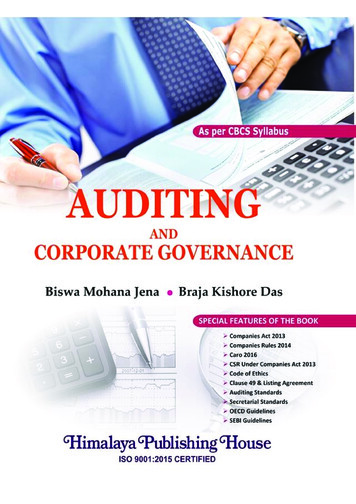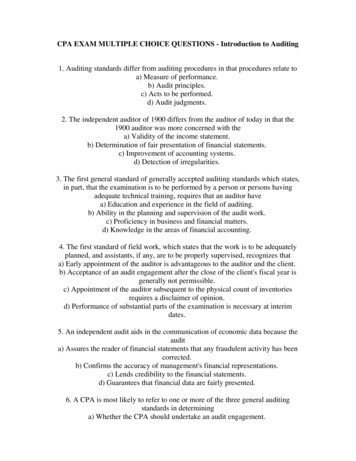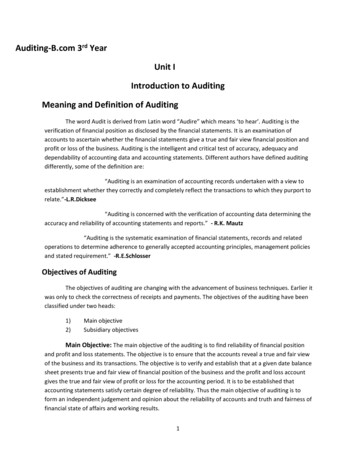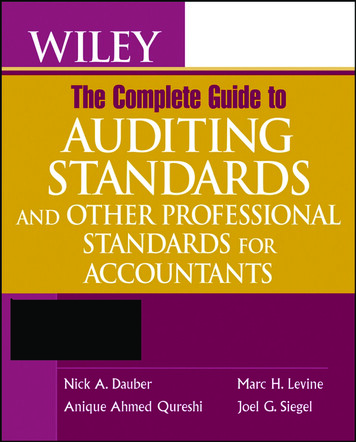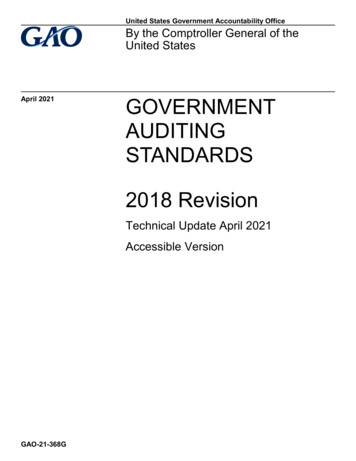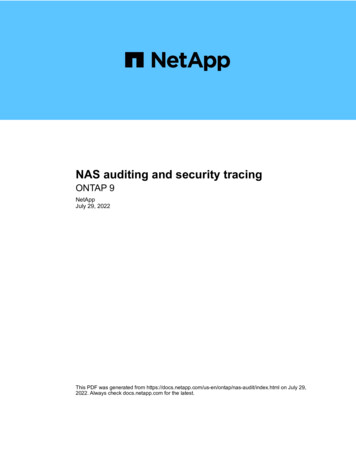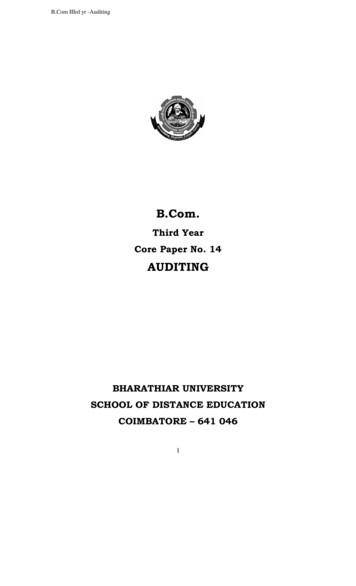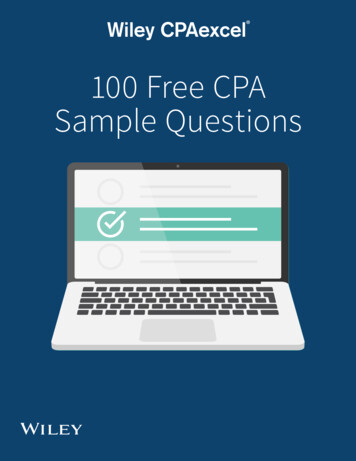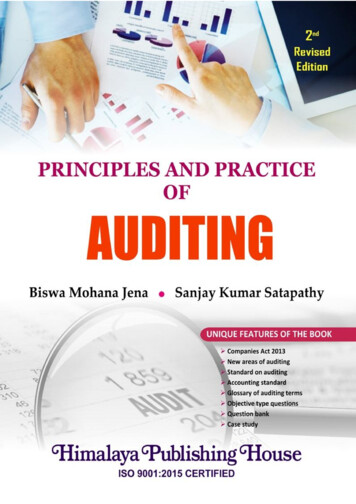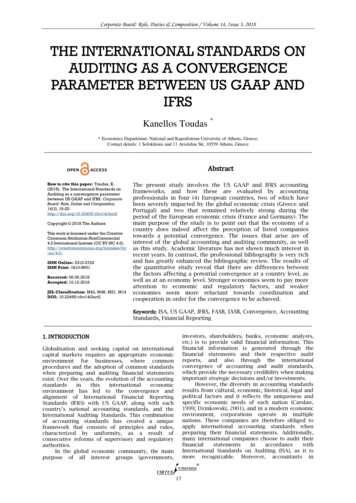
Transcription
Corporate Board: Role, Duties & Composition / Volume 14, Issue 3, 2018THE INTERNATIONAL STANDARDS ONAUDITING AS A CONVERGENCEPARAMETER BETWEEN US GAAP ANDIFRSKanellos Toudas ** Economics Department, National and Kapodistrian University of Athens, Greece;Contact details: 1 Sofokleous and 11 Aristidou Str, 10559 Athens, GreeceAbstractHow to cite this paper: Toudas, K.(2018). The International Standards onAuditing as a convergence parameterbetween US GAAP and IFRS. CorporateBoard: Role, Duties and Composition,14(3), 15-22.http://doi.org/10.22495/cbv14i3art2Copyright 2018 The AuthorsThis work is licensed under the CreativeCommons Attribution-NonCommercial4.0 International License (CC BY-NC /ISSN Online: 2312-2722ISSN Print: 1810-8601Received: 06.09.2018Accepted: 10.10.2018JEL Classification: M42, M48, M21, M14DOI: 10.22495/cbv14i3art2The present study involves the US GAAP and IFRS accountingframeworks, and how these are evaluated by accountingprofessionals in four (4) European countries, two of which havebeen severely impacted by the global economic crisis (Greece andPortugal) and two that remained relatively strong during theperiod of the European economic crisis (France and Germany). Themain purpose of the study is to point out that the economy of acountry does indeed affect the perception of listed companiestowards a potential convergence. The issues that arise are ofinterest of the global accounting and auditing community, as wellas this study. Academic literature has not shown much interest inrecent years. In contrast, the professional bibliography is very richand has greatly enhanced the bibliographic review. The results ofthe quantitative study reveal that there are differences betweenthe factors affecting a potential convergence at a country level, aswell as at an economy level. Stronger economies seem to pay moreattention to economic and regulatory factors, and weakereconomies seem more reluctant towards coordination andcooperation in order for the convergence to be achieved.Keywords: ISA, US GAAP, IFRS, FASB, IASB, Convergence, AccountingStandards, Financial Reportinginvestors, shareholders, banks, economic analysts,etc.) is to provide valid financial information. Thisfinancial information is generated through thefinancial statements and their respective auditreports, and also through the internationalconvergence of accounting and audit standards,which provide the necessary credibility when makingimportant strategic decisions and/or investments.However, the diversity in accounting standardsresults from cultural, economic, historical, legal andpolitical factors and it reflects the uniqueness andspecific economic needs of each nation (Carslaw,1999; Dzinkowski, 2001), and in a modern economicenvironment, corporations operate in multiplenations. These companies are therefore obliged toapply international accounting standards whenpreparing their financial statements. Additionally,many international companies choose to audit nal Standards on Auditing (ISA), as it ismore recognizable. Moreover, accountants in1. INTRODUCTIONGlobalisation and seeking capital on internationalcapital markets requires an appropriate economicenvironment for businesses, where commonprocedures and the adoption of common standardswhen preparing and auditing financial statementsexist. Over the years, the evolution of the ronment has led to the convergence andalignment of International Financial ReportingStandards (IFRS) with US GAAP, along with eachcountry’s national accounting standards, and theInternational Auditing Standards. This combinationof accounting standards has created a uniqueframework that consists of principles and rules,characterized by uniformity, as a result ofconsecutive reforms of supervisory and regulatoryauthorities.In the global economic community, the mainpurpose of all interest groups (governments,15
Corporate Board: Role, Duties & Composition / Volume 14, Issue 3, 2018multinational companies need to prepare financialreports according to different accounting andfinancial standards, but this is addressed by recenteconomic developments. Auditors of multinationalcompanies should take into account the differencesin standards when they check the financialstatements of these companies.Unfortunately, this diversity in accountingstandards is a major barrier to the capital flowacross national borders. In order to properlyevaluate an investment in another country, investorsshould interpret the existing financial statementsusing different accounting standards in order toconvert them into the accounting standards of theirown country, which is time-consuming, confusingand may create inconveniences in investment deals.The recent financial crisis of 2008 is also a factorthat affected and still influences capital flow, andtherefore investment deals. Countries, such asGreece, Portugal, Ireland and Spain were impactedthe most and received international aid fromstronger European economies, such as Germany andFrance (Kenny, 2018). Weaker economies wentthrough several financial reforms, and auditingbecame a serious matter, as these countries wereconstantly under the international microscope.Given the circumstances in the internationaleconomic environment, the harmonization ofaccounting and auditing standards enables economicactivity to benefit globally. The internationalizationof business and capital markets will result in aneconomicenvironmentinwhichcommonprocedures for drawing up and controlling financialstatements can benefit investors, lenders, financialinvestors, accountants and auditors (Gaspar et al.,2006). The International Accounting StandardsBoard (IASB) and the International AuditingStandards Board (IAASB) are striving to developharmonized accounting and auditing standards,respectively, to meet global requirements. And whilesome underdeveloped nations have and can operatewith less comprehensive accounting standards likeIAS, developed and developing nations, that survivedthe crisis, and want to compete in the internationaleconomic arena need to comply with harmonizedaccounting standards in order to regulate morespecific and complex financial issues.Thus, the present study will investigate thefactors affecting a potential convergence of the twoaccounting frameworks (IFRS and US GAAP), at acountry and at an economy level, in order todetermine whether there are significant differencesbetween them. First, the theory regarding the twoaccounting systems will be outlined and explained,to then look into the methodological approach usedto respond to the main research question. Theresults will then be presented and discussed. Lastly,conclusions will be drawn, and limitations, as wellfuture research will be discussed.(IASC) in 1973. The IASC resembled an independentprivate sector body whose main purpose was tofacilitate capital flow between different nations.Therefore, in order to make national accountingstandards more comparable, financial statementswere prepared in a more standardized manner. IASCallows a range of differences in permissibleaccounting methods. Major international playerssuch as the US, Japan and many European countrieshave not been forced to change their nationalstandards to comply with the emerging InternationalAccounting Standards promoted by IASC (Shamrock,2012). This strategy at least provided passivesupport for IASC's efforts by the world's mostimportant financial forces.In April 2002, IASC was renamed in theInternational Accounting Standards Board (IASB),aiming at developing a set of high quality ng the use and implementation of thesestandards, and achieving convergence of nationalaccounting standards with international accountingstandards. The IASB does not have the power toenforce compliance with these standards, but manycountries have allowed or encouraged the use ofIFRS as alternatives or complementary to theirnational accounting standards. In addition, theEuropean Union applies IFRS for all listed companiessince 2005.Moreover, Financial Accounting StandardsBoard (FASB) was established in 1973 and is theaccounting standard for the United States ofAmerica. Companies that prepare their financialstatements based on FASB accounting standards aresimultaneously admitted to stock exchanges in othercountries. The FASB is officially recognized by theSEC and the Securities and Exchange Commission,which is the US State Treasury Trust. In addition toconducting extensive research, the FASB issuesfinancial accounting reports including officialdefinitions of generally accepted accountingprinciples. All accounting principles and standardsgoverning US accounting practice are summarized incommonly accepted GAAP. A feature of on of a single national accounting planor sectoral accounting plans, as well as the lack ofarticles in the Commercial and Tax Code of USlegislation on business accounting obligations.Despite the extensive collaboration between theIASB and the US Financial Accounting StandardsBoard (US FASB), there are many differences betweenIFRS and US Standards. In 2002, Deloitte ToucheTohmatsu reached 78 specific differences betweenIFRS and US GAAP. However, these differences varybetween companies, depending on the particularfinancial position of each company. Moreover, theUS allows foreign companies to use either theirnational standards or IFRS; however, it requires aform which includes adjustments of use and networth to be presented in accordance with USStandards. In recent years, American Standards havebeen revised on the basis of global developments(Gordon & Hsu 2012; 2018). At the same time, IFRSshould take US GAAP into account, due to the UnitedStates' position in the global economy.2. LITERATURE REVIEW2.1. The nally, a major step towards tional Accounting Standards Commission16
Corporate Board: Role, Duties & Composition / Volume 14, Issue 3, 20182.2. Efforts to minimize the Standards’ gap2.3. The rule-based vs. principle-based approach toaccounting standards systemsIn the Norwalk Agreement (2002), the United Statesand the IASB agreed to step up their efforts andbring their financial reports in-line. However, despitethe extensive efforts to harmonize the twostandards, significant differences still exist betweenIFRS and US Standards, particularly in the range ofaccounting practices permitted by IFRS. Previoussurveys (Harris & Muller, 1999; Street & Gray, 1999)indicate that there were significant differences in thedetermination of the period's effect, research anddevelopment, exchange rates, but these differenceswere not insurmountable. In addition, Street, Nicholsand Gray (2000) found that the gap between IFRSand US Standards was closed.Plumlee and Plumlee (2008), in an effort toquantify the magnitude and direction of accountingdifferences between US and international accountingstandards, analysed a random sample of 100companies selected from foreign companies thatissued shares, completing the form 20-F of the SEC(US Securities and Exchange Commission) andaccepted the application of IFRS. Their analysis hashighlighted only a few categories with remarkableobjects for agreement in both contexts. Such itemsare post-employment pensions and pay, share-basedremuneration, evaluations on fixed assets, and inparticular property, plant and equipment, loss fromimpairment of intangible assets and specifically ofthe reputation and customer account and, finally, ofdeferred taxes (Atwood et al., 2012; Clacher et al.,2013).Similarly, Gordon et al. (2008), Gordon and Hsu(2012, 2018) and Bellandi (2012) examined the valueagreements based on the 20-F statement for duallisted companies in the US and the countries oforigin where they use the IFRS framework andconcluded that the five the main categories with thelargest differences are: a) mergers of companies, b)pension issues, c) tax issues, d) intangible assets ande) debt categorization.From an accounting standpoint, regardingdifferences, Plumlee and Plumlee (2008) concludedthat 75% of foreign private equity companiesreported more net income in accordance with IFRSthan with US GAAP. Their conclusion is alsoconsistent with the study by Gordon et al. (2008),which states that, on average, net IFRS-basedrevenue is above the American Standard based onthat. Regarding the equity of the companies, theresult of the research is not clear in one direction,since only 43% of the companies referred to in IFRShave a higher net position than those reported in USGAAP. Provided that equity is positive or negative,the average net equity position is significant, i.e. at 35.1% and -23.7% respectively, and varies dependingon the size of the business and the industry towhich it refers.The IASB and the FASB intend to continue theirongoing action on global acceptance, convergenceand partnerships (Hong et al., 2018). The effort toincrease the global acceptance of the new fixedplatform of IAS and IAASB faculty should be animportant next step for the top players. This, ofcourse, should include consultation with nationalstandard-setting bodies, regulators and other usersof the financial statements in order to identify thechallenges of admission of the faculty at the globallevel and the ways in which they could to overcome.When accounting standards systems are comparedand characterized, IFRSs are usually referred to asconcept-based, while US GAAP is categorized as rulebased. In recent years, the FASB has repeatedlymoved towards moving to more concept-basedstandards, as it has been increasingly growingcriticism of the current approach, especially afterthe Enron scandal. Rules-based on rules are believedto provide companies with the ability to presenttheir transactions, making them able to respond tospecific accounting manipulations, even if thesemanipulations do not present the true economicpicture (Maines et al., 2003; Sawabe, 2005).Research into quality differences between USGAAP and IFRS is limited. For example, the study byHarris and Muller (1999) used data from the USStock Exchange that concerned a specific sample offoreign companies that presented their results inaccordance with IFRSs and, in addition, adaptedthem to US Standards to complete Form 20-F. Valueis defined in terms of price and yield models, andthese adjustments seem to add value. In contrast,research that followed (Leuz, 2003; Bartov et al.,2005) records that American and InternationalStandards do not show significant differences inquality. These two surveys used a sample of Germanlisted companies, which can choose and use eitherIFRS or American Standards. These studies differ inquality measurement, similarly to Ntoung’s et al.(2015) study which provides evidence from differenteconomies where differences are notable. Leuz(2003) defines quality in terms of market asymmetryand market liquidity, while Bartov et al. (2005) usemore traditional value-related measurements. In2006, Barth et al. they studied a sample of Europeanand American companies by applying multiplemeasurements (e.g. profit manipulation) g information.US GAAP is an example of a rule-basedapproach. It consists of a large number of specificaccounting standards, and each template contains alarge number of rules (as well as exceptions to therules) that attempt to address any possible situationthat may arise. However, in 2002, the new FASBpresident signalled his support for a shift towards aprinciple-based approach (Financial Times, May 27,2002).An approach based on principles like the oneused for the IFRS is examining each case as a whole,with its particular specifications. Thus, for eachIAS/IFRS, the IASB Conceptual Framework appliesand each standard is an individualized reflection ofthe whole. Specificity, at the level of detail, issacrificed for reasons of clarity regarding the overallapproach (Ehoff & Fischer, 2013; Palea & Scagnelli,2016). The success of GAAP depends directly ontheir application and their ability to adapt to anevolving global economy. We believe that asglobalization evolves, we will see more and morecases where GAAP will fail to evolve, omit to adaptto new accounting scenarios and address accountingproblems in a timely manner (Strickland et al., 2014).17
Corporate Board: Role, Duties & Composition / Volume 14, Issue 3, 2018lead to greater discrepancies in the results of theaudits. Thus, the principle of standardizationapproach, of course, is also characterized bysignificant advantages. First of all, this approachemphasizes that the auditor is the ultimatecontroller and the most responsible for the auditprocedures to be followed in an audit. However, ifthe auditor considers on the ground that, due tospecific ad hoc conditions, he has to modify theprocedures he needs to follow for an audit, he mustfeel ready to do so at any time. The approachconsidered supports a mentality that promotes suchmodes of action (Callahan, 2004; Herron &Gilbertson, 2004; Imhoff, 2003; Satava et al., 2006).In addition, the principle-based approach canbe applied in the widest possible range of cases,without the need to constantly and continuouslyupdate and update with newer, more restrictive andmore detailed provisions. Moreover, due to thebreadth of this approach, it is easier to deal withfuture problems by creating control standards at thecurrent stage (Nelson, 2003). Assessing theaforementioned advantages and disadvantages ofboth the above-mentioned modelling approaches, wecan conclude that a critical and productivecombination of both approaches is desirable.Typically, each person who participates in astandardization organization, at least at least, tendstowards one or the other approach (Ian, 2008;FASB/IASB, 2006; FSA, 2007).Finally, we must always keep in mind that auditstandards, which are distinguished by high quality,promote and impose such professional behaviour onthe part of auditors, in order to enhance the efficiencyand effectiveness of controls. In any case, the exactprocedures required for the implementation of thecontrol standards are also left to the professionaljudgment of the auditor and depend on the prevailingcircumstances of each case. This determination of thenecessity of the professional judgment of the auditorought to be taken seriously by the bodies setting upthe control standards.Given all the theory that distinguishes the twostandards, the main research question that arises isthe following:What are the factors that make it difficult tofully converge the two accounting frameworks (IFRSand US GAAP), and do they differentiate dependingon the level of impact of the European financial crisis?2.4. The rule-based vs. the principle-based approachin the audit standards systemsIssues falling under international auditing standardshave been extensively addressed in the internationalliterature. Warren (1975) investigated whether theauditing standards are evenly applicable throughtwo alternative approaches to monitoring andcontrolling audit quality. While Kinney's research(1986) concluded that there is a model for thepreferences expressed for controversial auditstandards by the Auditing Standards Board. Thisaffects those involved in setting audit standards andauditing research. In addition, the results indicatedthat the composition of the Audit StandardsCommittee has an impact on the nature of theauditing standards.The view that standard setting is a politicalprocess has been accepted by academics (Hooks,1991). The majority of critically acclaimed academicwritings have been made at the macroeconomic leveland focus on the procedures and presentations ofsetting standards rather than the technicalassessment of the outcome. As the audit work ishighly regulatory, the Audit Regulation operates inaccordance with their professional standards andaccountability as the auditor is responsible for theloss of users of the financial statements due to auditerrors. The work of Willekens, Steele and Miltz(1996) provides an analysis of the effects ofuncertainty from negligence, audit quality standardsand audit fees produced. The research has resultedin the development of a number of proposals onhow the rules and the existing audit standardsinteract, emphasizing the influence of uncertaintyon the rules of responsibility on the quality of auditwork. In the context of these different perceptionsand interests, different approaches to the creation ofcontrol standards can be followed from time to time.One of these approaches considers that any controlstandards need primarily to support any audit workaudits and also support any rule-based approach(Nelson, 2003; Benston et al., 2008).Typically, attempting to create patterns of suchan approach raises the need for the createdstandards to be restrictive and detailed (Kaplow,2000). Indeed, this trend is extremely timeconsuming. Furthermore, in order to quantify theobjectives of an inspection contravenes the elementof subjectivity that is implicitly implicated inauditors' judgments and beliefs. Another approachconsiders that auditing standards should providegeneral guidelines and set out general principles, i.e.fundamental principles governing audit, leavingimportant scope for the proper practice of any ofthe principles-based approach (Nelson, 2003;Benston et al., 2008). This approach also emphasizesthe limitation of the requirements included in thecontrol standards. In addition, this approach allowsdifferent interpretations and application of controlstandards depending on financial variables, culturaldifferences between countries and fferences in auditor training (Nelson, 2003).Moreover, the approach based on a principlesbased approach is characterized by a lower degreeof consistency between the results of differentcontrols. This is to be expected if one considers thatthis approach permits modification of the auditmethodology and practice followed, if thecircumstances so require and in some cases also3. METHODOLOGY3.1. Sampling method and procedureThe main purpose of this study is to a) investigatethe factors that impede the convergence of the twoaccounting frameworks (IFRS and US GAAP), and b)determine whether there are differences betweencountries that were more affected by the Europeanfinancial crisis. A quantitative research approachwas followed.Listed companies from the preselectedcountries were randomly chosen and since the mainaim was the comparison between them, the numberof responses was limited to 50 per country.Furthermore, since this research has not beenconducted before, a smaller initial sample wasagreed to serve the purpose of the present study.The online questionnaire was distributed to asample of 400 auditors and financial directors fromfour European countries (France, Greece, Germany18
Corporate Board: Role, Duties & Composition / Volume 14, Issue 3, 2018and Portugal), two of which were affected at a higherdegree by the crisis, and the other two remainedrelatively strong. A detailed e-mail was sent to theaccountingdepartmentofthepreselectedcompanies, stating the purpose of the study,ensuring anonymity and providing the contactdetails of the researcher. When the number ofresponses reached 50 for a country, responses wereno longer accepted for that particular country. Thequestionnaires were composed in both English andthe official language of each country (French, Greek,German and Portuguese) and were back-translatedfor quality purposes. The total number of responsesthat were collected at the end of the third week of theinitial distribution (October 2017) was 200. Despitethe small sample of this research, it is still representative, as this study was conducted to determinewhether there are differences between countries thatwere affected at different levels by the crisis.The listed companies that differed in size, wereinitially contacted via e-mail Online questionnairescomprising of two main sections, one focusing ondemographics and professional experience, and onefocusing on the factors affecting the convergence ofthe two accounting frameworks. The second sectionincluded twelve factors (Table 1), that the auditorsand financial advisors had to rank on a 5-pointLikert scale (1 Not at all, 5 A lot).Table 1. Factors that make it difficult to fullyconverge the two accounting frameworks (IFRS andUS GAAP)QQ1Q2Q3Q4DescriptionConvergence costRequired changes in regulatory regimesRequired changes to legal systemsRequired changes to auditing standardsCo-ordination and co-operation between regulatoryauthorities internationallyGlobal acceptance of IFRS as a set of high-qualityaccounting standardsRequired Strengthening of the IASB StructureIASB's objectivity and independence when compilingIFRSsFlexibility in adopting different versions of IFRSLack of adequate involvement of internationalregulators in the IASB's standard-setting processLack of training, understanding and experience ofaccountants who prepare financial statements using IFRSLack of uniformity in the application of IFRS by alljurisdictionsQ5Q6Q7Q8Q9Q10Q11Q123.2. SampleThe sample consists of 200 respondents, 50 fromeach of the four countries that are underexamination (France, Greece, Germany and Portugal).Table 2. Demographics of the sample (N 200)GenderMale143 71.5 % 25-35Female57 28.5 % 35-4545-5555 AgeEducation189 % Master/ACCA/ACA16773 36.5 % BSc Economics/other338643 %23 11.5 %As shown in Table 1, 71.5 % of the respondentswere male, whereas 28.5 % were female. As far as ageis concerned, 9 % of the respondents were within the25-35 age group, and 36.5 %, 43 % and 11.5 % in the35-45, 45-55 and 55 and up respectively. 167 out ofthe 200 respondents that represent the 83.5 % havereceived Master/ACCA/ACA qualifications, whereas16.5 % has only received an economics degree.Regarding the position of the respondents within thecompanies, 40.5 % are CFOs, 6.5 % are partners,48.5 % are managers and 8 % are seniors. Lastly,regarding accounting experience, only a 7 % has 5-10years of experience, whereas 41.5 % and 51.5 % have11-19 and 20 and up years of experience83.5 %16.5 nce (years)40.5 % 5-10147%6.5 % 11-1983 41.5 %48.5 % 20 103 51.5 %8%respectively in the field. Qualification andexperience shows that the sample consists ofindividuals who are informed about the accountingstandards. That, coupled with extensive experiencein the field makes the sample representative.4. RESULTS AND DISCUSSIONThe analysis of the responses was statisticallyanalysed. Table 3 presents the results from thecurrent study as a whole, whereas Table 4 and Table5 present the results categorized by stronger andweaker economies and by country respectively.Table 3. Factors that make it difficult to fully converge the two accounting frameworks (IFRS and US GAAP)(N 2,4820,770.07In particular, from the overall results, auditorsand financial advisors perceive cost (Q1) andrequired changes in audit standards (Q4) as adeterrent to convergence (Median 3), withouthowever considering that the specific factors mayhave a major influence on the convergence pathway(median 3 which means that the auditors evaluatethe effect of the comparators as "Enough" ratherthan "Very"). Instead, the auditors express theirunanimity that factors, such as the required changesin regulatory regimes (Q2) and legal systems (Q3), 4,2440,540.01Q113,9340,570.01Q124,0640,560.01well as coordination and cooperation betweenregulatory authorities worldwide (Q5) and therequired reinforcement of the IASB structure (Q7),may have a more significant impact (Median 4)towards the path to a potential convergence. On thecontrary, it is noted that the auditors interviewed donot take the global acceptance of IFRS as a set ofhigh-quality accounting standards (Q6) (Mean 2.48,p-value 0.07 (not significant)). On a similar note,the objectivity and independence of the IASB in thepreparation of the full convergence IFRS (Q8) was19
Corporate Board: Role, Duties & Composition / Volume 14, Issue 3, 2018poorly evaluated by the respondents (Mean 1.86, pvalue 0.03). This finding strengthens the belief thatIFRS is a reliable accounting standard, whose qualityin relation to other accounting frameworks is notcalled into question by international markets, andespecially the European market that is underexamination. At the same time, this finding is anindication of the transparency and credibility of theIASB as a body of high-quality standards, as theauditors do not realize that the IASB's objectivityand independence in the development of IFRS (Q8)may be a potential impediment to convergence. Atthis point, it is noted that the answers to thesequestions (Q6 & Q8), show the highest dispersion,with SD 0.77 and 0.73 respectively, meaning thatthere was little consistency. Finally, other factorsthat the average auditors consider to be "verydifficult" for full convergence are the lack offlexibility in adopting various versions of IFRS (Q9),the lack of adequate involvement of internationalregulators in the IASB's standard-setting process(Q10), the lack of training, understanding andexperience of accountants who prepare financialstatements using IFRS (Q11) and the lack ofuniformity in the application of IFRS by alljurisdictions (Q12). These findings are of significantimportance, as they reveal that both regulatoryauthorities in different countries and companiesthemselves do not seem to focus on the uniform andfull application of IFRS, which could be an indicationof the priority given by the State and businesses tocomply with the tax pr
Keywords: ISA, US GAAP, IFRS, FASB, IASB, Convergence, Accounting Standards, Financial Reporting . Corporate Board: Role, Duties & Composition / Volume 14, Issue 3, 2018 16 multinational companies need to prepare financial . International Accounting Standards Board (IASB), aiming at developing a set of hi gh quality and


